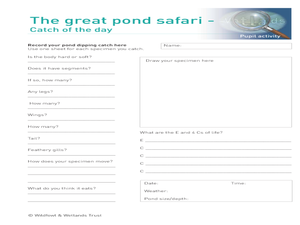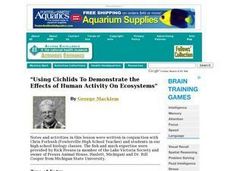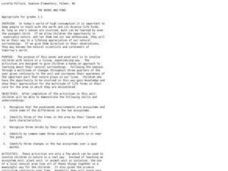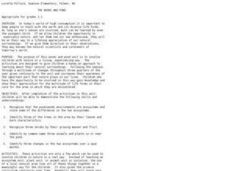Curated OER
Human Impact on the Environment
In this environmental science worksheet, students complete a crossword puzzle with 26 questions about human impact on the environment.
Curated OER
How Do Plants and Animals Change the Environment Around Them?
If you have elodea and snails in your classroom aquarium, or if you have access to a pond with these organisms, your young biologists can set up a controlled experiment to determine how certain ecosystems respond in light and dark...
Curated OER
Norman Suburban Activity
Students analyze the factors affecting organisms in the pond ecosystem. In this environmental science lesson, students perform an experiment to determine pH, nutrients and temperature of different pond sites. They present their result to...
Curated OER
Pond Safari
Students investigate organisms and animals by examining a nearby pond. In this ecosystem lesson, students participate in a field trip to a local pond where they utilize a net to gather animals, plants and pollution items, Students...
Curated OER
Mini-Ecosystems
Third graders identify the living and non living things in a book read aloud and discuss the interactions represented in the book. Then, they research and include a list of food that each animal needs in an ecosystem. Finally, 3rd...
Curated OER
Ecosystems: What Are They and How Do They Work?
Students explore the characteristics of major ecosystems, the interactions of the organisms within the systems, and the effects of humans on the system. Both living and non-living components are examined in this five lesson unit.
Curated OER
Exploring Ecosystems
Fourth graders create an ecosystem as a class. They have already produced smaller ones. They use a pond or something similar on school grounds to meet the needs of certain plants and animals of their ecosystem. Specifically created will...
Curated OER
The Living Environment
Students explore the cycles of an ecosystem. In this environmental science lesson, students work in groups to research the nitrogen cycle, the water cycle, or the oxygen-carbon dioxide cycle. Students prepare a PowerPoint or other...
Curated OER
"Using Cichlids To Demonstrate the Effects of Human Activity On Ecosystems"
Students explore the freshwater ecosystem of Africa's Lake Victoria by creating a freshwater aquarium. They investigate factors affecting the aquarium's ecosystem and conduct lab activities.
Curated OER
Food Chain/Food Web
Students explore ecosystems. In this ecology lesson, students read an article explaining ecosystems. Students create a visual organizer with index cards using components of various ecosystems.
Curated OER
Animal Habitat Dioramas
What a better way to have learners show what they know than with a diorama? Kids research an animal, its habitat, ecosystem, and environment in order to create a three-dimensional diorama. Have older children write a short paper on their...
Curated OER
Week 3: Pollution Source and Effects
Lab groups set up an experiment to observe what happens over time in collected pond water when fertilizer, representing pollution, is added. This website does not include student lab sheets, but background information, materials, and...
Curated OER
Pond 1: Pond Life
Young scholars investigate familiar and unfamiliar ecosystems using Internet resources. They explore how various organisms satisfy their needs within their environments and study the kinds of relationships that exist between organisms...
Curated OER
Pond 1: Pond Life
Learners work together to investigate familiar and unfamiliar ecosystems. Using the internet, they discover how different organisms use their environment to satisfy their needs. They also examine the relationshiops between organisms...
Curated OER
The Woods and Pond
Students explore nature in a living, experiencing way. In this woods and ponds lesson plan, students recognize that ponds/woods environments are ecosystems, identify three of the trees in the area by their leaves and bark...
Curated OER
Wild and Wetlands
Upper graders identify the major characteristics of a wetland. They explore the human factors that change a wetland and write a descriptive paragraph about wetlands. This comprehensive lesson also has an interactive "Watershed Game"...
Curated OER
Water Wonders
Students explore hydrology concepts. In this environment and biology instructional activity, students identify and describe macroinvertebrates using a variety of pictures and resources. Students observe and write about a classroom...
Curated OER
Water and Land Ecosystems
Pupils investigate the differences between a land and aquatic ecosystem. They use the information in order to present it in an assessment. There are target questions that can be used to guide research, lead a classroom discussion, or...
Curated OER
Living Organisms as Indicators of Pollutants in Fresh Water Ecosystems
Students observe the effects of pollution on living organisms. In this pollution lesson plan, students observe fresh water Hydra and look at their structures and movement. They place samples of pond and lake water on the Hydra and...
Curated OER
The Gaia Hypothesis: An Approach to Problem Solving in the Environment
Students are introduced to the Gaia hypothesis by examining a conceptual sketch. In groups, they analyze the way they can use Dewey's method for problem solving to solve problems within the environment. They are given a problem facing...
Curated OER
Ecology - Ecosystem
Third graders research ecosystems, the work of ecologists, John Muir's contribution to the environment and an endangered species of their choice. They read books, participate in discussions, and write reports.
Curated OER
The Woods and Pond
Students participate in hands-on activities to explore their natural surroundings. They recognize that ponds and woods are ecosystems and compare differences between the two. They identify trees by their bark and leaves.
Curated OER
Pond Life Identification Kit
Young scholars explore ecology and biodiversty. They use the wet-mount procedure to make several slides to view using the microscope and draw what they see.
Curated OER
Ecosystems
Third graders identify and define an Ecosystem and the basic needs of all animals. They collect pond water in a pickle jar. They observe the organisms that are in the jar to keep an ongoing record of the creatures and their population.

























